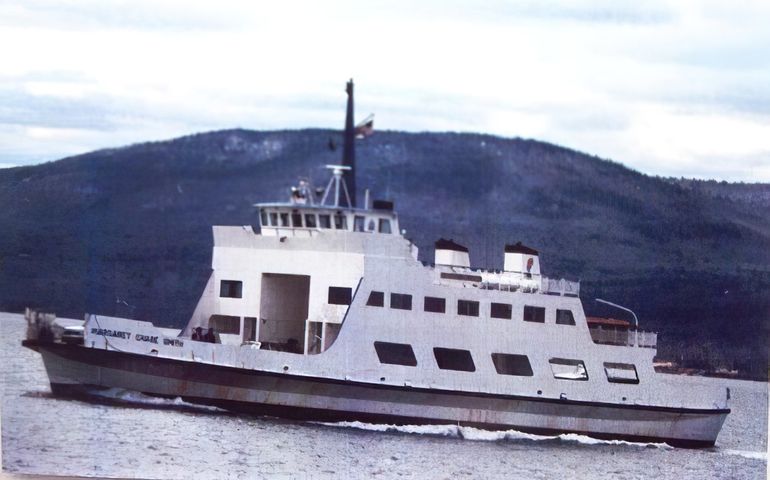Feds award $33M to replace Islesboro ferry with hybrid-electric vessel
 Courtesy Islesboro Historical Society, mainememory.net
The Margaret Chase Smith is Islesboro's third ferry, replacing the Governor Muskie in 1987. Seen here ca. 2000, the Margaret Chase Smith is leaving Lincolnville and heading toward Islesboro. The Camden Hills are in the background.
Courtesy Islesboro Historical Society, mainememory.net
The Margaret Chase Smith is Islesboro's third ferry, replacing the Governor Muskie in 1987. Seen here ca. 2000, the Margaret Chase Smith is leaving Lincolnville and heading toward Islesboro. The Camden Hills are in the background.
More Information
Plans are in the works to replace the 35-year-old Margaret Chase Smith ferry that serves Islesboro in Penobscot Bay with a new hybrid-electric vessel.
The $33 million in funding is through the Federal Transit Administration’s new Ferry Programs established under the Bipartisan Infrastructure Law to support passenger ferries as they transition to climate-friendly technologies
Diesel-hybrid ferry
The replacement for Margaret Chase Smith would reduce greenhouse gas emissions and promote environmental sustainability for the roughly 600 residents of the island of Islesboro, a rural community in Penobscot Bay that relies on passenger ferry service.
As one of the six island communities that Maine State Ferry Service serves, the Margaret Chase Smith Islesboro route is the most traveled, serving roughly 600 year-round residents.
The route carried over 180,000 walk-on passengers and over 73,000 vehicles in 2019 alone.
Pingree lives on North Haven, another of the unbridged islands for which the service operates regular ferry service.
The small, rural communities, which have year-round populations between 30 and 1,300 people, rely on the service for access to jobs, services, goods and medical treatment.
“Maine’s year-round island communities are a vital part of our state’s history, culture and economy, and the ferries that serve them are critical and in need of modernization,” said U.S. Rep. Chellie Pingree, D-1st District. “As we electrify our auto and trucking fleet and expand our network of charging stations throughout the state, ferries are a natural extension of that evolution and shouldn’t be left behind.”
Funding and operations
The Maine Department of Transportation project received a $28 million injection from the federal government through its Bipartisan Infrastructure Law, according to Pingree and U.S. Sen. Susan Collins, R-Maine.
Another $5 million will go to MDOT’s new Ferry Service for Rural Communities Program, designed to improve and support the Maine State Ferry Service. The funding will support MaineDOT staffing, maintenance and customer communication in efforts to maintain and enhance service reliability in the face of increasing operating costs.
In addition, as MaineDOT adds cleaner vessels, such as hybrid-electric vessels, to its fleet, the federal funding will support cleaner, reduced emissions transportation for customers, the island and mainland communities, and the surrounding areas.
Pingree and Collins co-signed letters of support for the projects.
“Maine’s ferries are indispensable to those who live and work in our island communities, providing passenger, freight and postal services and transporting students to school and people to their jobs,” said Collins. “By improving recruitment and retainment efforts for vessel crews and implementing an environmentally friendly engine technology, these investments will enhance the future of ferry service.”
The Casco Bay Island Transit District also has diesel-electric hybrid propulsion system projects in the works, with construction underway on a hybrid replacement for the Machigonne II, which serves Portland's Peaks Island. It is expected to be on the water by 2023 and plans for a second hybrid vessel to replace the district’s Maquoit II.
The vessels will feature automated, rapid-charging battery systems.














0 Comments